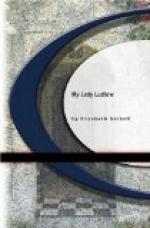“I think, Mr. Gray, we will drop the subject. It is one on which we are not likely to agree.”
Mr. Gray’s ruddy colour grew purple and then faded away, and his face became pale. I think both my lady and he had forgotten our presence; and we were beginning to feel too awkward to wish to remind them of it. And yet we could not help watching and listening with the greatest interest.
Mr. Gray drew himself up to his full height, with an unconscious feeling of dignity. Little as was his stature, and awkward and embarrassed as he had been only a few minutes before, I remember thinking he looked almost as grand as my lady when he spoke.
“Your ladyship must remember that it may be my duty to speak to my parishioners on many subjects on which they do not agree with me. I am not at liberty to be silent, because they differ in opinion from me.”
Lady Ludlow’s great blue eyes dilated with surprise, and—I do think—anger, at being thus spoken to. I am not sure whether it was very wise in Mr. Gray. He himself looked afraid of the consequences but as if he was determined to bear them without flinching. For a minute there was silence. Then my lady replied—“Mr. Gray, I respect your plain speaking, although I may wonder whether a young man of your age and position has any right to assume that he is a better judge than one with the experience which I have naturally gained at my time of life, and in the station I hold.”
“If I, madam, as the clergyman of this parish, am not to shrink from telling what I believe to be the truth to the poor and lowly, no more am I to hold my peace in the presence of the rich and titled.” Mr. Gray’s face showed that he was in that state of excitement which in a child would have ended in a good fit of crying. He looked as if he had nerved himself up to doing and saying things, which he disliked above everything, and which nothing short of serious duty could have compelled him to do and say. And at such times every minute circumstance which could add to pain comes vividly before one. I saw that he became aware of our presence, and that it added to his discomfiture.
My lady flushed up. “Are you aware, sir,” asked she, “that you have gone far astray from the original subject of conversation? But as you talk of your parish, allow me to remind you that Hareman’s Common is beyond the bounds, and that you are really not responsible for the characters and lives of the squatters on that unlucky piece of ground.”
“Madam, I see I have only done harm in speaking to you about the affair at all. I beg your pardon and take my leave.”
He bowed, and looked very sad. Lady Ludlow caught the expression of his face.
“Good morning!” she cried, in rather a louder and quicker way than that in which she had been speaking. “Remember, Job Gregson is a notorious poacher and evildoer, and you really are not responsible for what goes on at Hareman’s Common.”




